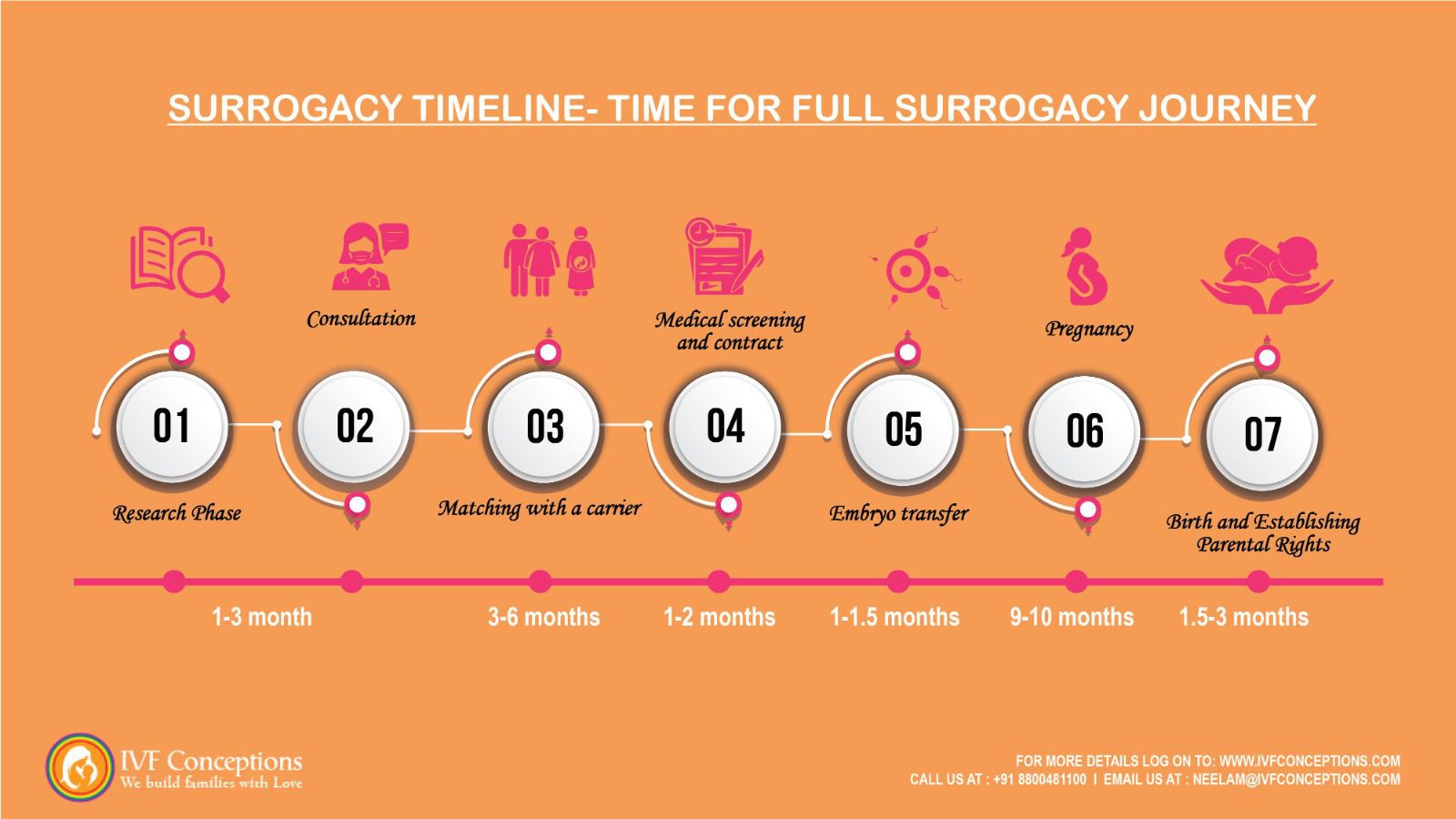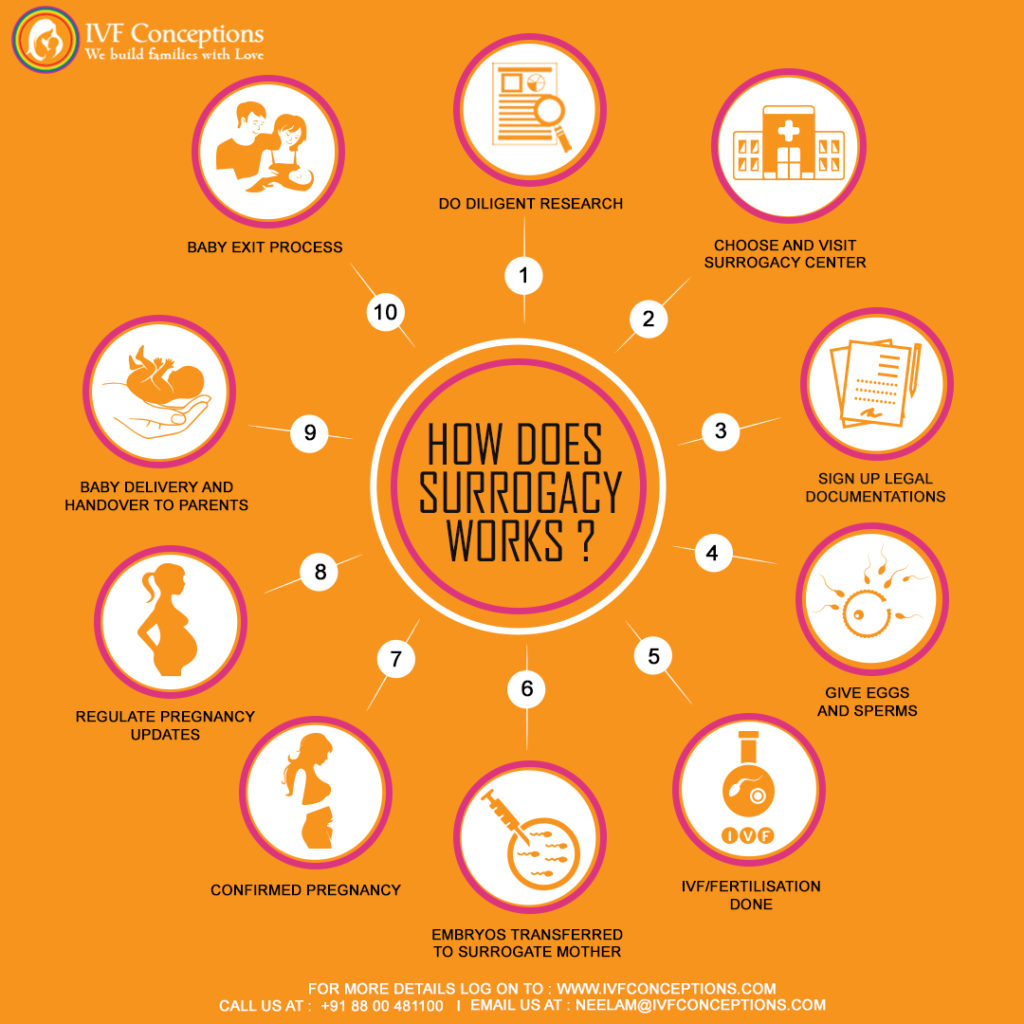How Long Does the Surrogacy Process Take? A Comprehensive Timeline of your surrogacy journey
The surrogacy process is a complex, multi-step journey that involves legal procedures, medical treatments, and emotional commitment. The typical timeline for completing a surrogacy journey ranges from 12 to 24 months, depending on factors like surrogate matching, embryo transfer success, legal approvals, and birth documentation.
This guide provides a step-by-step breakdown, expected delays, and comparisons between domestic and international surrogacy timelines.
One of the most common questions intended parents ask when considering surrogacy is: How long does the surrogacy process take? The surrogacy journey can range from 12 to 24 months or more, depending on various factors such as the matching process, medical clearances, legal steps, and how quickly pregnancy is achieved. This blog post will break down the surrogacy timeline and highlight key milestones so intended parents can have realistic expectations about how long it takes to complete a surrogacy journey.
Step-by-Step Surrogacy Timeline
| Stage | Description | Timeframe |
|---|---|---|
| Research & Decision | Exploring surrogacy options, choosing a destination, selecting an agency | 1-3 Months |
| Finding a Surrogate | Agency-led matching process, screening, approval | 2-6 Months |
| Medical Evaluations | Surrogate health tests, embryo preparation, legal clearance | 1-3 Months |
| Embryo Transfer | IVF procedure, pregnancy confirmation | 1-2 Months |
| Pregnancy | Regular checkups, surrogate care, legal filings | 9 Months |
| Birth & Legal Processing | Parental rights, baby’s passport/visa processing (if international) | 1-3 Months |
✅ Total Estimated Timeline: 12 to 24 months (or longer for international cases).
📌 Need Expert Guidance on Your Surrogacy Journey?
📩 Get a free consultation today!
🌍 Website: www.ivfconceptions.com
📧 Email: neelam@ivfconceptions.com
📲 WhatsApp/Viber/Line: +91-8800481100
 Here is an outline of the surrogacy process timeline for intended parents:
Here is an outline of the surrogacy process timeline for intended parents:
| Stage | Description of Stage | Duration |
| Research Phase | Explore family-building options and decide on surrogacy. | Personal timeframe |
| Consultation and Application | Choose a surrogacy agency, sign an agreement, and start embryo creation (if needed). | 1-3 Months |
| Matching | The agency finds and presents potential gestational carriers. Meet and decide on a match. | 3-6 Months |
| Medical Screening and Contracts | Carrier undergoes medical and psychological screening. Sign a surrogacy contract. | 1-2 Months |
| Embryo Transfer | Prepare for embryo transfer. Success may take multiple attempts. | 1-1.5 Months |
| Pregnancy | Gestational carrier’s pregnancy, approximately 40 weeks. | 9-10 Months |
| Birth and Postpartum | Baby’s birth, parental rights, and the postpartum period. | 1.5-3 Months |
What are the different kinds of surrogacy?
Between gestational and traditional surrogacy, there is a very important distinction. The mother has no genetic connection to the infant she is carrying in gestational surrogacy. The method of surrogacy involves fertilizing the intended father’s sperm (or sperm donor) with the intended mother’s egg (or egg donor) to form an embryo through in vitro fertilization.
The surrogate’s own egg is fertilized by artificial insemination in traditional surrogacy, and the surrogate is both the carrier and the biological mother of the surrogate baby.
Types of surrogacy agreements
There are two types of surrogacy agreements –
- Altruistic surrogacy– Altruistic surrogacy applies to those surrogacy arrangements where no monetary compensation is offered to the surrogate. The mother is a close relationship with the planned parents in most altruistic surrogacy arrangements. The surrogate can be a relative or a family friend. Surrogacy in the UK, Canada, and Australia is altruistic surrogacy.
- Commercial surrogacy – In addition to paying medical costs, etc., a commercial gestational surrogacy arrangement provides a fixed monetary compensation to the surrogate, this is known as surrogate mother compensation. In Georgia, Ukraine, and the USA (some states), commercial surrogacy is allowed legally.
Read more:
Which are the best countries for surrogacy?
Best International surrogacy country for single and gay couples
Pros and cons of surrogacy that parents must know

How Long Does the Surrogacy Process Take
-
Initial Consultation and Planning (1-3 Months)
The first step in the surrogacy process involves extensive research and planning. Intended parents typically start by consulting with surrogacy agencies, fertility clinics, or surrogacy attorneys. During this stage, they will:
- Research surrogacy options (domestic vs. international, traditional vs. gestational surrogacy)
- Choose an agency or decide to pursue independent surrogacy
- Meet with fertility specialists to evaluate fertility treatments (IVF, egg or sperm donation)
- Undergo initial consultations and fertility assessments
The initial planning stage can take 1-3 months, depending on how quickly intended parents choose an agency and undergo medical evaluations. Many agencies also require psychological screening for intended parents.
-
Matching With a Surrogate (2-6 Months)
Once the intended parents are ready to proceed, the next significant step is finding a surrogate mother. The matching process can take between 2 and 6 months or longer, depending on availability and the specific criteria that the intended parents have in mind. Agencies often assist with the matching process by reviewing profiles of potential surrogates to find someone who shares similar values and expectations.
Some factors that can impact the timeline include:
- Location preferences (local vs. international surrogates)
- Whether the surrogate has prior experience
- Medical and psychological evaluations
- Compatibility in terms of communication style and relationship expectations
For independent surrogacy, this process can take longer as intended parents need to find and screen potential surrogates on their own.
-
Legal Contracts (1-2 Months)
Once a surrogate has been matched, it is essential to draw up legal contracts to protect the rights of both parties. The surrogacy contract outlines the responsibilities, financial compensation, and medical expectations for both the surrogate and the intended parents. Both parties will need independent legal counsel to ensure the contract meets all applicable surrogacy laws.
The legal process can take 1-2 months, depending on the complexity of the agreement and the time needed for both parties to review and sign the contract. In some cases, legal negotiations may extend this period if changes or clarifications are needed.
-
Medical Screening and Preparation (1-3 Months)
After legal contracts are signed, the medical process begins. The surrogate will need to undergo a series of health evaluations to ensure she is physically prepared for the embryo transfer. These include:
- Blood tests
- Ultrasounds
- Uterine evaluations
- Hormonal treatment to synchronize the surrogate’s cycle with the intended mother or egg donor
At the same time, the fertility clinic may be preparing eggs from the intended mother or an egg donor, as well as sperm from the intended father or a sperm donor. If using in vitro fertilization (IVF), embryos are created in the lab and prepared for transfer.
This medical screening and preparation process can take anywhere from 1 to 3 months, depending on the surrogate’s menstrual cycle, medical history, and any additional procedures needed.
-
Embryo Transfer and Pregnancy Confirmation (1-2 Months)
Once the surrogate has been cleared and prepared, the embryo transfer procedure takes place. This is typically done at a fertility clinic, where one or more embryos are transferred into the surrogate’s uterus. After the transfer, the surrogate will be monitored closely to check for pregnancy.
The waiting period after embryo transfer to confirm pregnancy is around 10-14 days. If the transfer is successful, the surrogate will continue to be monitored through blood tests and ultrasounds to ensure the pregnancy is progressing as expected.
If the first embryo transfer is unsuccessful, another round of embryo transfer may be necessary, which can add 1-2 months to the process.
-
Pregnancy (9 Months)
Once pregnancy is confirmed, the surrogacy process follows the typical timeline of a pregnancy, lasting approximately nine months. During this time, the surrogate will attend regular prenatal appointments, and intended parents may visit or communicate regularly for updates.
Some intended parents may choose to attend important prenatal appointments such as ultrasounds or the birth itself, depending on their location and relationship with the surrogate.
-
Birth and Post-Birth Legalities (1-2 Months)
The final stage of the surrogacy process involves the birth of the baby and completing any post-birth legalities. Intended parents will often travel to be present for the birth and to meet their child. Depending on where the surrogacy takes place, additional legal steps may be required to finalize parental rights, such as obtaining a birth certificate and ensuring that the intended parents are listed as legal parents.
This process can take an additional 1-2 months, particularly for international surrogacy arrangements where passports and visas may be required for the baby to travel.
Summary of Surrogacy Timeline
Here’s a breakdown of the typical surrogacy timeline:
| Stage | Timeframe |
| Initial Consultation & Planning | 1-3 months |
| Matching With a Surrogate | 2-6 months |
| Legal Contracts | 1-2 months |
| Medical Screening & Preparation | 1-3 months |
| Embryo Transfer & Pregnancy | 1-2 months |
| Pregnancy | 9 months |
| Birth & Post-Birth Legalities | 1-2 months |
| Total Surrogacy Process | 12-24 months (or longer) |
 Factors That Can Extend the Surrogacy Process
Factors That Can Extend the Surrogacy Process
While the surrogacy process can take as little as 12 months in some cases, there are several factors that can extend the timeline:
Factors That May Extend the Surrogacy Process
🔴 Finding a Suitable Surrogate: Availability can vary by country and agency policies.
🔴 Medical Issues: Failed embryo transfers may require additional attempts, delaying pregnancy.
🔴 Legal & Documentation Delays: International surrogacy may require court approvals and exit processes.
🔴 Multiple Embryo Transfers: Not all pregnancies succeed on the first attempt, extending the journey.
🔴 Country-Specific Laws: Some countries have longer legal approval times for intended parents.
More resources on the topic of the surrogacy process:
How does the surrogacy process work?
All about surrogacy cost with the breakdown
All about the gay surrogacy process
Domestic vs. International Surrogacy Timelines
| Surrogacy Destination | Estimated Timeline | Key Delays |
|---|---|---|
| USA | 12-18 months | Surrogate matching can take longer, but legal certainty is high |
| Georgia | 14-20 months | Faster matching, but legal approvals take time |
| Mexico | 15-22 months | Varies by state; LGBTQ+ surrogacy legal in some regions |
| Colombia | 12-20 months | Strong legal framework, but documentation for international parents takes time |
| Ukraine | 14-24 months | Requires careful legal navigation due to geopolitical issues |

Conclusion
The surrogacy process is a complex, multi-step journey that requires patience, commitment, and careful planning. While most surrogacy journeys take between 12 to 24 months, the timeline can vary based on individual circumstances, including medical, legal, and logistical factors.
Contact as many surrogacy professionals as possible and understand the dynamic of the surrogacy process and the cost of your case.
Final Thoughts: Planning for a Smooth Surrogacy Journey
The surrogacy process requires patience, planning, and legal clarity. Understanding the timeline factors and choosing the right destination can help intended parents navigate the journey more efficiently.
📌 Need Expert Guidance on Your Surrogacy Journey?
📩 Get a free consultation today!
🌍 Website: www.ivfconceptions.com
📧 Email: neelam@ivfconceptions.com
📲 WhatsApp/Viber/Line: +91-8800481100

FAQs: How Long Does the Surrogacy Process Take?
1. How long does the surrogacy process typically take?
The surrogacy process generally takes between 12 to 24 months. This timeframe includes planning, finding a surrogate, legal procedures, medical screenings, embryo transfer, pregnancy, and post-birth legal formalities.
2. What factors can extend the surrogacy timeline?
Several factors can extend the timeline, including:
- Difficulty in finding a suitable surrogate
- Unsuccessful embryo transfers requiring multiple attempts
- Legal complexities, especially in international surrogacy cases
- Medical complications during pregnancy
- Cross-border travel delays and obtaining legal documentation for the baby
3. How long does it take to match with a surrogate?
Matching with a surrogate can take anywhere from 2 to 6 months, depending on the availability of qualified surrogates and the intended parents’ specific preferences.
4. How many embryo transfers are typically required?
In some cases, pregnancy is achieved after the first embryo transfer. However, multiple transfers may be needed, which can extend the timeline by a few months.
5. How long does the legal process take for surrogacy?
The legal process, including drafting and reviewing surrogacy contracts, can take 1 to 2 months. International surrogacy may require additional legal steps post-birth to establish parental rights, which can take another 1 to 2 months.
6. Can surrogacy be completed faster than 12 months?
While rare, some surrogacy journeys may be completed in less than 12 months if all aspects—such as finding a surrogate, legal contracts, and embryo transfer—proceed smoothly. However, it’s important to be prepared for delays and unforeseen complications.
7. Does the surrogacy process differ for international surrogacy?
Yes, international surrogacy often involves additional legal steps, travel logistics, and compliance with the laws of both the surrogate’s country and the intended parents’ country. This can add time to the overall process.
8. What if the surrogate doesn’t get pregnant on the first embryo transfer?
If the surrogate doesn’t become pregnant on the first embryo transfer, another transfer can be scheduled. Each transfer cycle usually takes around 1 to 2 months, depending on the surrogate’s health and the availability of viable embryos.
9. What happens after the baby is born?
After the baby is born, there are post-birth legalities to finalize parental rights, especially for international surrogacies. This can take 1 to 2 months, and intended parents may need to obtain travel documents for the baby.
10. How long does the surrogacy journey take from embryo transfer to birth?
From the successful embryo transfer to birth, the journey lasts approximately 9 months, following the typical duration of pregnancy.
Reference Used:
- WHO – Assisted Reproductive Technology Guidelines: who.int
- American Society for Reproductive Medicine (ASRM): asrm.org
- European Society of Human Reproduction and Embryology (ESHRE): eshre.eu


 Factors That Can Extend the Surrogacy Process
Factors That Can Extend the Surrogacy Process